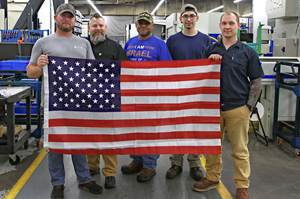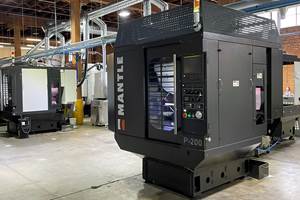Solving Coolant Problems Cuts Costs In Half For Alabama Job Shop
This manufacturer is impressed with this semi-synthetic coolant since it found that over the course of a few weeks, no bacteria grew, no odor developed, and no excessive coolant evaporation occurred.
Share






Valcool semi-synthetic VNT-800 coolant from Valenite (Madison Heights, Michigan) is lasting twice as long as the previous coolant while cutting coolant costs in half at Franklin Manufacturing Inc., a large job shop in Russellville, Alabama.
Franklin Manufacturing uses 18 CNC lathes and mills, as well as seven manual mills to produce parts for fabricating customers. They include fabricators of metal buildings and high-voltage transmission towers, as well as some aerospace part producers.
Like many job shops, Franklin's business moves in cycles of feast or famine, even in the good times. Once a rush job is completed, a lag often follows before the next job begins. And when new jobs come in, they are typically not big enough to keep all of the machine tools busy at the same time. Consequently, when the machines remain idle, the stagnant coolant begins to form bacteria on the surface. A terrible odor caused by the bacteria permeates the shop. None of the treatments Franklin used ever controlled the odor satisfactorily.
To head-off anticipated bacteria problems, a specialist would stir stagnant coolant. However, if his skin touched the coolant, a rash developed. In addition, the specialist found that coolant evaporated at a faster rate than expected, causing make-up coolant to be added.
"We decided to look for an alternative coolant when we realized how much time the coolant was costing us," says Shane Bendall, plant manager. "A change was definitely necessary ."
Valenite recommended VNT-800 coolant, a semi-synthetic coolant with a proven history of low bacteria growth and odor. Over the course of the next few weeks, no bacteria grew, no odor developed, and no excessive coolant evaporation occurred. The coolant proved so successful on that machine that Franklin negotiated a contract with Valenite to use it exclusively on all of the company's machine tools.
Since switching one year ago, Mr. Bendall says he sees many benefits. "Valcool lasts twice as long as the previous coolant and it really resists bacteria growth. Because we don't run 24 hours a day, seven days a week, there's a chance that the sump will sit there without any movement for a lengthy time. That's when bacteria grow. We are really satisfied with the life of the coolant. In fact, we have reduced the amount of the coolant we purchase by 25 percent to 33 percent.
Mr. Bendall says that coolant costs have been cut greatly. "That's because we don't have to replace it as often, the coolant stays in the mixture longer and, it doesn't evaporate like the previous coolant. Plus, manpower spent on coolant maintenance has been reduced by half. In addition, we are drilling and tapping holes with Valenite coolant instead of using cutting oils."
Another benefit of the semi-synthetic coolant is the lubricating effect it has on machine tool beds and ways that helps prevents rust. Similarly, parts which previously had to be coated with oil immediately after being machined to prevent rust, now can go two or three days before any signs of rust appear.
Mr. Bendall reports "I'm not disposing of as much coolant now because Valcool lasts twice as long as the previous coolant. The old coolant had animal fat in it which promoted bacteria growth, turned bad and had to be disposed of relatively frequently.
Customer service was key to Valenite landing this piece of business, according to Mr. Bendall. "They put forth a tremendous effort in educating us about Valcool cutting fluids and how to best apply their coolants. They didn't explain it in complicated scientific terms, either. Instead they explained it in terms our guys could relate to so that it all made sense."
"They trained my people on how to manage the coolant and on how to keep the right mixture in the machine to keep it from being either too rich or too weak. They did an excellent job in training and educating our employees on the proper use of coolant." Recommendations included how to control bacteria. Valenite suggested installing an air line in the sump of any machine tool scheduled to be idle for any length of time. Air would bubble to the surface, breaking up the oil. Franklin then went one step further and installed skimmers in several machine tool sumps to skim oil off the coolant.
Mr. Bendall concludes, "With Valenite's Valcool, our shop is running just like it's suppose to run. You can't ask more from a semi-synthetic coolant than that."
Related Content
Inside Machineosaurus: Unique Job Shop with Dinosaur-Named CNC Machines, Four-Day Workweek & High-Precision Machining
Take a tour of Machineosaurus, a Massachusetts machine shop where every CNC machine is named after a dinosaur!
Read MoreManufacturing Technology and Training in Europe
NTMA’s European Tech Tour exposed attendees to the latest technology and traditional training methods used by European manufacturers.
Read MoreFinding Skilled Labor Through Partnerships and Benefits
To combat the skilled labor shortage, this Top Shops honoree turned to partnerships and unique benefits to attract talented workers.
Read MoreIn Moldmaking, Mantle Process Addresses Lead Time and Talent Pool
A new process delivered through what looks like a standard machining center promises to streamline machining of injection mold cores and cavities and even answer the declining availability of toolmakers.
Read MoreRead Next
AMRs Are Moving Into Manufacturing: 4 Considerations for Implementation
AMRs can provide a flexible, easy-to-use automation platform so long as manufacturers choose a suitable task and prepare their facilities.
Read MoreMachine Shop MBA
Making Chips and 91ÊÓƵÍøÕ¾ÎÛ are teaming up for a new podcast series called Machine Shop MBA—designed to help manufacturers measure their success against the industry’s best. Through the lens of the Top Shops benchmarking program, the series explores the KPIs that set high-performing shops apart, from machine utilization and first-pass yield to employee engagement and revenue per employee.
Read More



















